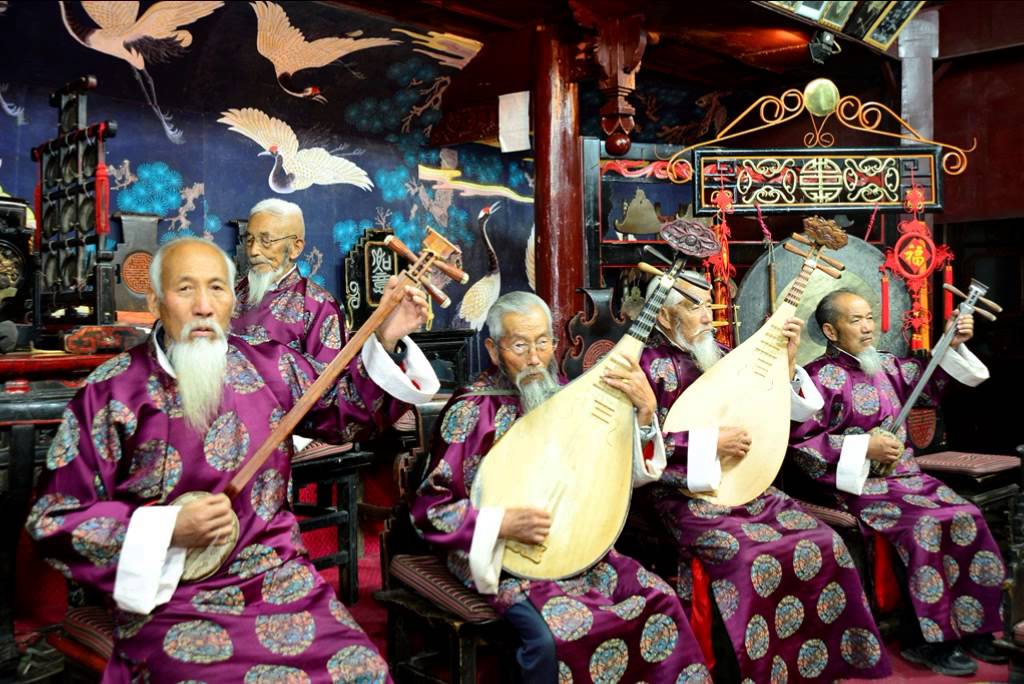












Naxi Ancient Orchestral Music
The Naxi are an ethnic group inhabiting the foothills of the Himalayas in the northwestern and southwestern parts of Southwest China's Yunnan and Sichuan provinces respectively. Both the ancient tea-horse road and the Silk Road ran their ways through the area, leaving behind a cultural mix of Han and Tibetan characteristics.

The heavenly atmosphere of the Naxi area fosters in its residents artistic qualities and a poetic mindset. Along with innate talents for poetry, calligraphy , and painting, the people of the region seem to be born with a gift for music.
Naxi ancient music is believed to have its roots in Xian ancient music. However, Naxi ancient music, with its mixture of literary lyrics, poetic topics, and musical styles from the Tang (618-907) and Song dynasties (960-1279), as well as some Tibetan influences, has developed its unique style.

Interestingly, the music from Central China has been well preserved in Naxi ancient music as a result of the Naxi's geographical isolation, while the music directly from Central China was lost, as the inland was transformed many times during China's changing history. As a result, Naxi music boasts itself as a "living fossil of music."
It can be performed in two ways - sitting or walking. Seated performances are a kind of chamber music that involves more than 20 musical instruments , including wind instruments, such as the di zi, sheng (a kind of reed pipe wind instrument), and guan zi, and percussion instruments, such as the zuo gu (sitting drum), war drum, du gu (single drum), big and small cymbals, big gongs, a slit drum, and so on.
Baisha Fine Music
Passed down as the "Musical Legacy of the Yuan Dynasty (1271-1368)," baisha fine music is one of ancient China's large-scale, classical orchestral music that contains choruses, clear storylines, and music movements. Baisha fine music consists of dance, songs, and instrumental music that have twenty-four tunes, locally known as qupai. Although archaic, simple, and elegant in style, modern baisha is exquisite, euphonious, and dynamic in character.
It is said that when Kublai Khan was on his expedition to Yunnan, he once received help from Mailiang, the leader of the Naxi people in Lijiang, a city in southern Yunnan Province where some of the Naxi lived. On his departure, Kublai Khan left to Mailiang half a band and a musical score as a gift. Therefore, baisha fine music is also called "honoraria on departure".
Dong Jing Music
This type of Daoist music is widely spread among the Naxi people. Since the Ming (1368-1644) and Qing (1644-1911) dynasties, it has been gradually introduced to Yunnan from Central China, and is deeply rooted in the cultural circles of the Naxi people. Over time, the Naxi have added their own styles and the skills used in playing their local folk songs when playing dong jing music, giving the music a Naxi musical tone.
After dong jing music was disseminated to Lijiang, for quite a long time, its enjoyment was confined to gentlemen, whom were the only ones allowed to participate in dong jing concerts. However, as the Naxi people are born with a musical nature, such a limiting shackle was eventually broken.
Today, folk musicians have already made dong jing music a part of the folk world. There are at least four full orchestras of elderly men in and around Lijiang, and within the county there are scores of folk bands playing the ancient music that has been blended with Naxi flavor.
At least four unabridged orchestras exist in and around Lijiang, and these characteristic bands are famous for their "three olds":
Old Men: most of the players are over 70 years old;
Old Musical Instruments: many are antiques dating back to more than 100 years, some of which can't be found anywhere else;
Old Songs: all are antiquated classical music.
Members of the bands are drawn from all kinds of occupations including teachers, artisans, farmers, butchers, clerks, and so on. Naxi ancient music bands have been invited to perform in Hong Kong , Great Britain, the United States, Holland, Belgium, and Norway, exercising great influence and gaining attention from all over the world.
Admission Fee:¥0

You will only receive emails that you permitted upon submission and your email address will never be shared with any third parties without your express permission.
